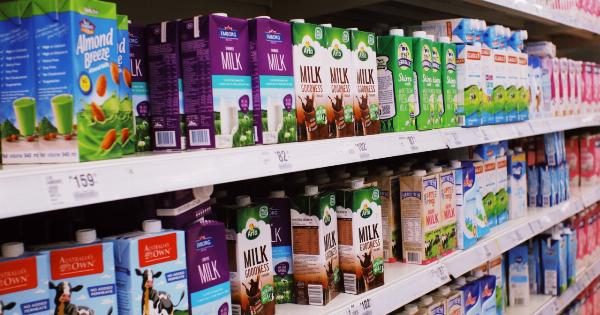When it comes to managing cholesterol levels, making dietary changes is crucial. One such modification is choosing the right milk options.
With an abundance of milk choices available in the market, it’s important to know which ones can help uplift cholesterol levels. In this article, we will explore various milk options that are beneficial for those looking to improve their cholesterol profile.
1. Skim Milk
Skim milk, also known as fat-free milk, is an excellent option for individuals concerned about their cholesterol levels. This milk variety contains minimal fat, making it ideal for those aiming to reduce their saturated fat intake.
Skim milk is packed with essential nutrients such as calcium, vitamin D, and protein, making it a wholesome choice for overall health.
2. Almond Milk
If you are lactose intolerant or following a plant-based diet, almond milk can be a great alternative. It is made from ground almonds and water, giving it a creamy texture and a pleasant nutty flavor.
Almond milk is naturally low in saturated fat and cholesterol, making it heart-healthy. Additionally, it contains vitamin E, which acts as an antioxidant and offers various benefits to the body.
3. Soy Milk
Soy milk is derived from soybeans and has gained popularity as a nutritious milk alternative. It is rich in plant-based proteins and healthy fats, consisting of polyunsaturated fats that can help lower LDL (low-density lipoprotein) cholesterol levels.
Soy milk is also a good source of vitamins and minerals, including calcium and vitamin D.
4. Oat Milk
Oat milk is made from oats and water, offering a creamy texture and a mildly sweet taste. It is an excellent choice for individuals with high cholesterol levels, as it is free from cholesterol and low in saturated fat.
Oats themselves contain a soluble fiber known as beta-glucan, which can actively work to lower LDL cholesterol levels.
5. Coconut Milk
Coconut milk, extracted from the pulp of coconuts, has a rich and creamy texture. However, it is important to note that the canned version of coconut milk contains higher amounts of saturated fat, which can negatively impact cholesterol levels.
Opt for lighter versions or use it sparingly if you choose to include coconut milk in your diet.
6. Flaxseed Milk
Flaxseed milk is made from ground flaxseeds and water, offering a nutty taste and a creamy texture. Flaxseeds are rich in omega-3 fatty acids, which have been shown to have beneficial effects on heart health.
Omega-3s can help reduce LDL cholesterol levels and promote a healthy lipid profile.
7. Goat Milk
Goat milk is another milk option for individuals looking to uplift their cholesterol levels. It contains less lactose than cow’s milk, making it a suitable alternative for those who are lactose intolerant.
Goat milk also provides essential nutrients such as calcium, vitamin A, and phosphorus.
8. Hemp Milk
Hemp milk is made by blending water with hemp seeds, resulting in a creamy and slightly nutty milk alternative. It is considered a complete protein, meaning it provides all the essential amino acids required by the human body.
Hemp milk is naturally free from cholesterol and low in saturated fat.
9. Rice Milk
Rice milk is derived from brown rice, water, and sometimes added sweeteners. It is a suitable option for individuals with multiple allergies, as it is free from dairy, lactose, and soy.
However, it is important to note that rice milk is relatively low in protein and may not provide the same nutritional benefits as other milk options.
10. Cashew Milk
Cashew milk is made by blending water with cashews, resulting in a creamy and slightly sweet milk alternative. It is naturally cholesterol-free and low in saturated fat.
Cashew milk is also a good source of minerals such as magnesium, phosphorus, and iron.
Conclusion
Making the right milk choices can have a significant impact on cholesterol levels. Opting for skim milk, almond milk, soy milk, oat milk, and other milk varieties low in saturated fat and cholesterol can help uplift your cholesterol profile.
It is essential to consider your dietary needs, taste preferences, and any underlying health conditions when selecting the most suitable milk option for you. By incorporating these nutritious milk alternatives into your diet, you can take a step towards improving your overall cardiovascular health.






























